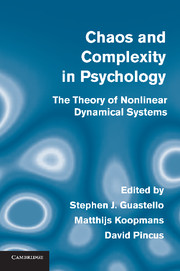Book contents
- Frontmatter
- Contents
- Contributors
- Preface
- 1 Introduction to Nonlinear Dynamics and Complexity
- 2 Collective Intelligence: Observations and Models
- 3 Neurodynamics and Electrocortical Activity
- 4 Psychophysics
- 5 Temporal and Spatial Patterns in Perceptual Behavior: Implications for Dynamical Structure
- 6 Embodied and Embedded: The Dynamics of Extracting Perceptual Visual Invariants
- 7 Origins of Order in Cognitive Activity
- 8 Nonlinear Complex Dynamical Systems in Developmental Psychology
- 9 Developmental Psychopathology: Maladaptive and Adaptive Attractors in Children's Close Relationships
- 10 Psychopathology
- 11 Coherence, Complexity, and Information Flow: Self-Organizing Processes in Psychotherapy
- 12 The Dynamics of Human Experience: Fundamentals of Dynamical Social Psychology
- 13 Group Dynamics: Adaptation, Coordination, and the Emergence of Leaders
- 14 Organizational Psychology
- 15 Complexity, Evolution, and Organizational Behavior
- 16 Agent-Based Modeling Within a Dynamic Network
- 17 Epilogue: Psychology at the Edge of Chaos
- Index
Preface
Published online by Cambridge University Press: 18 December 2013
- Frontmatter
- Contents
- Contributors
- Preface
- 1 Introduction to Nonlinear Dynamics and Complexity
- 2 Collective Intelligence: Observations and Models
- 3 Neurodynamics and Electrocortical Activity
- 4 Psychophysics
- 5 Temporal and Spatial Patterns in Perceptual Behavior: Implications for Dynamical Structure
- 6 Embodied and Embedded: The Dynamics of Extracting Perceptual Visual Invariants
- 7 Origins of Order in Cognitive Activity
- 8 Nonlinear Complex Dynamical Systems in Developmental Psychology
- 9 Developmental Psychopathology: Maladaptive and Adaptive Attractors in Children's Close Relationships
- 10 Psychopathology
- 11 Coherence, Complexity, and Information Flow: Self-Organizing Processes in Psychotherapy
- 12 The Dynamics of Human Experience: Fundamentals of Dynamical Social Psychology
- 13 Group Dynamics: Adaptation, Coordination, and the Emergence of Leaders
- 14 Organizational Psychology
- 15 Complexity, Evolution, and Organizational Behavior
- 16 Agent-Based Modeling Within a Dynamic Network
- 17 Epilogue: Psychology at the Edge of Chaos
- Index
Summary
Nonlinear dynamical systems (NDS) theory is the study of how complex processes unfold over time and is sometimes known as chaos theory or complexity theory. Perhaps it was one of those experiences in which “You had to be there,” but the early days of NDS in psychology were rife with excitement. There was so much potential for solving old and new problems and transforming the way psychology was studied that everyone present knew it could occupy entire careers. The days of saying, “Here's what chaos and complexity can do!” were gone years ago, however. NDS scholars have embarked on the less glamorous but ultimately more important task of systematic model building and developing an empirical research agenda. We estimate that about 50 books are published each year that are relevant to some aspect of NDS, psychology, and the life sciences, as well as numerous articles in peer-reviewed journals, such as Nonlinear Dynamics, Psychology, and Life Sciences, signifying that the field is moving forward at a rapid pace.
The waterfall of progress creates two dilemmas that we attempt to resolve by composing this book. The first is to answer a simple question: “What should I read first?” The second is how to reconcile the escalating gap between the state of the science in NDS and the average level of awareness of its accomplishments by professionals in psychology.
- Type
- Chapter
- Information
- Chaos and Complexity in PsychologyThe Theory of Nonlinear Dynamical Systems, pp. xiii - xviPublisher: Cambridge University PressPrint publication year: 2008



